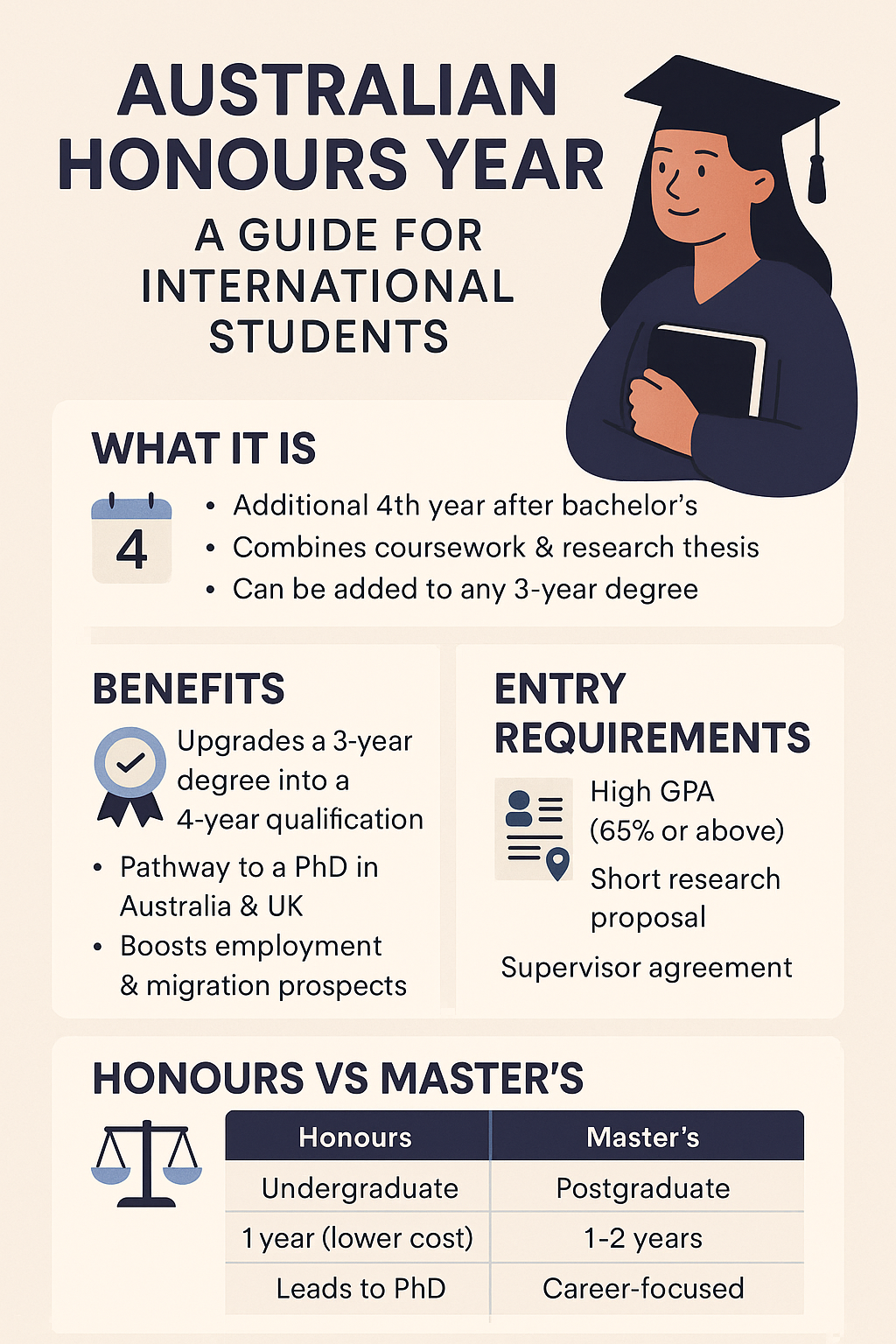An honours year is a fourth year of study that builds on your undergraduate degree. It’s in-built in some degrees, but can be added to any degree if your grades are high enough. Honours can also help your three-year Australian degree be recognised overseas, as it better matches the length of degrees in other countries.
If you’re an international student studying in Australia (or planning to) you may have heard about doing an “honours year” after your bachelor’s degree. Here’s everything you need to know before you decide to do one (or not do one) as you prepare to enrol (If you’re Australian and interested in honours read this post instead).
An Honours Year Explained
Become the student you’ve always wanted to be
Study smarter, write better, and finish your degree faster
In Australia, an honours year is a research-focused fourth year of study that builds on your undergraduate degree. It can be built into certain degrees, like engineering, law, or psychology, or added as a separate one-year program after completing a standard three-year bachelor’s.
In both cases, it involves advanced coursework and an independent research project, supervised by an academic. You’ll typically submit a thesis or dissertation, after completing all of the project design, data analysis, and academic writing.
There are a few honours programs that don’t have coursework. Instead, they focus completely on the research side of things. Although this is more common for honours programs that are added on after an undergraduate, as opposed to those that are in-built.
Honours is often embedded into four-year regulated professional degrees (e.g. Bachelor of Engineering (Honours)), but in many fields (especially in degrees like science, health, business, and arts) it’s an optional add-on. You apply for it separately after finishing your bachelor’s degree, usually in your final semester.
Whether built-in or standalone, honours gives you a chance to:
- Increase your knowledge in a specific area of interest (e.g., Geophysics, after completing a Geology degree)
- Develop research skills that can lead to publication or further study
- Strengthen your academic and professional credentials
- Improve the recognition of your Australian degree overseas
Honours Timeline and Project Requirements
Honours usually starts the same time of year as the undergraduate coursework (so late February), but it’s not completed in semester- or trimester-mode. You will simply start your research project (and any coursework) and work through the entire academic year. Submission of the thesis is often due before the standard academic Semester 2 ends, around October (although this varies between universities). An honours research project usually involves:
- Designing a research proposal, including funding
- Presenting an introduction seminar on your project
- Completing the research and data analysis
- Writing and submitting a thesis
- Presenting a results seminar on your project
The research focus of the honours program is ideal for anyone that likes to work independently, but if you struggle with working on your own and need a lot of direction it can be incredibly challenging and stressful.

How Honours Fits Into the Australian System
It’s important to understand where honours sits in the Australian Qualifications Framework (AQF). Honours is an undergraduate qualification at AQF Level 8, above a standard bachelor’s degree (Level 7), but below a master’s degree (Level 9).
It is not equivalent to a master’s degree – not in Australia, and not anywhere else. While often referred to as a ‘postgraduate’ year, it’s still considered an undergraduate qualification. You can read more about the AQF here.
How Honours Can Help International Students

For international students, honours can be one of the most helpful (and important) things you can do before heading back home:
1. Helps Convert a 3-Year Degree into a 4-Year Qualification
Many countries, including China, India, and the United States, expect four years of undergraduate study before recognising a degree for postgraduate admission or professional registration.
By completing honours, you turn your three-year Australian bachelor’s degree into a four-year qualification, which is more likely to be recognised for:
- Postgraduate admission in countries where 4 years is the standard
- Government or regulated profession applications (e.g., teaching, nursing, engineering)
- Credential evaluations for overseas work or migration
2. Builds a Strong Case for PhD or Research Pathways
If you’re thinking about a Master’s or PhD, either in Australia or abroad, honours gives you hands-on experience in academic research. In many countries (like the US or Canada), honours can strengthen your application for a Master’s or PhD, even though it doesn’t replace the need for a master’s.
In Australia and the UK, however, a First Class or strong Second Class Honours (Division A) result is often enough to apply directly to a PhD.
3. Boosts Employment Prospects and Professional Recognition
Honours demonstrates you can work independently, complete long-term projects, and produce high-quality academic writing, which are all traits employers value. In fact, many Australian employers now view honours as a minimum requirement, rather than a standard three-year degree, because of the skill-set it guarantees.
In regulated professions (like law, medicine, teaching, or engineering), having an honours year can also support credential evaluations, especially if your base degree is only three years.
4. Skilled Migration and Post-Study Work Rights
If you plan to stay in Australia after graduating, doing an honours year can also help:
- Temporary Graduate Visa (485): Honours can extend your stay in Australia under the Post-Study Work stream.
- Skilled Migration: Certain occupations on the skilled occupation list (like scientist, engineer, teacher) may require qualifications at Level 8 or higher. Honours can improve your points score and eligibility.
Always check with a registered migration agent or the Department of Home Affairs for specific visa and migration criteria.
International Recognition of Honours Degrees
Here’s a quick overview of how honours is generally viewed in other countries:
| Country | Honours Recognition |
|---|---|
| China | Often required to convert 3-year degree to 4-year equivalence for postgraduate study. Adds credibility for job applications. |
| India | Helps meet the minimum duration expected for postgraduate admission (usually 4 years). |
| United States | Seen as an advanced undergraduate qualification, but not equivalent to a master’s. Useful for strengthening graduate school or employment applications. |
| United Kingdom | Recognised as a standard part of their own system. Honours from Australia is fully recognised. |
Want a detailed breakdown of how your degree is recognised? Check our full guide on international recognition of Australian degrees.
Honours Entry Requirements and Application Tips
To apply for honours as an international student, you’ll usually need:
- A distinction average (65–70%) or higher
- A completed three-year bachelor’s degree in a relevant field
- A supervisor who agrees to support your research project
- A short research proposal or expression of interest
- Proof of English language proficiency (if not previously supplied)
Tip: Application deadlines are often earlier for international students. Start looking into honours in your final year of undergrad, and talk to potential supervisors at least one semester in advance.
You can read more about how to apply at the different universities in my honours guide for domestic students.
Choosing Between Honours and a Master’s
If you’re not sure whether honours or Master’s is the right path for you, consider these points:
| Honours Year | Master’s Degree |
|---|---|
| Undergraduate qualification | Postgraduate qualification |
| Research + some coursework | Coursework, or research-only option |
| 1 year (usually full-time) | 1–2 years |
| Cheaper (often subsidised) | More expensive (especially for internationals) |
| Pathway to PhD (with First or 2A Honours) | Pathway to PhD (especially research-based master’s) |
| Good for academic careers | Good for industry or professional roles |
In short:
- Choose honours if you’re interested in research or a PhD
- Choose a master’s if you want professional advancement in a specific field
Ready to Succeed At University? 🎓
Starting university can feel overwhelming—but it doesn’t have to. Imagine having a step-by-step guide for managing your time, smashing your assessments, and graduating with results you’re proud of. That’s exactly what the Uni Pro Accelerator is here for. This course is designed to help you:
✅ Plan your degree like a pro, avoiding expensive mistakes that add years to your degree.
✅ Write better essays, reports, and literature reviews with less stress.
✅ Manage your time effectively, even during exam season.
✅ Build the skills you need to ace every assessment – from research to editing.
Here’s why it works: I went from being a high school dropout to graduating with the university medal, completing a PhD, and teaching at a university. I’ve been where you are, and I know what it takes to succeed.
🚀 Get Started Today
Enrolling in Uni Pro isn’t just about surviving university – it’s about thriving. Don’t leave your success to chance.